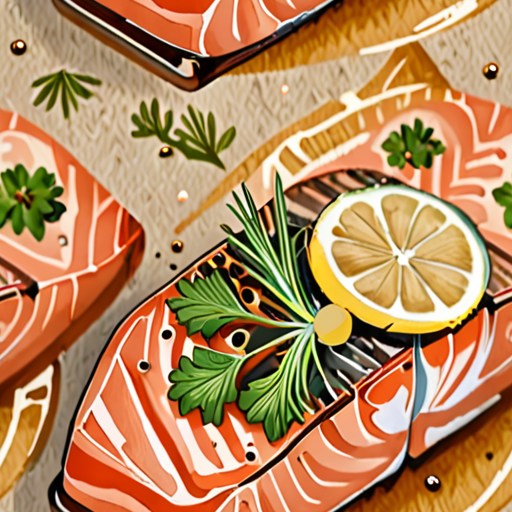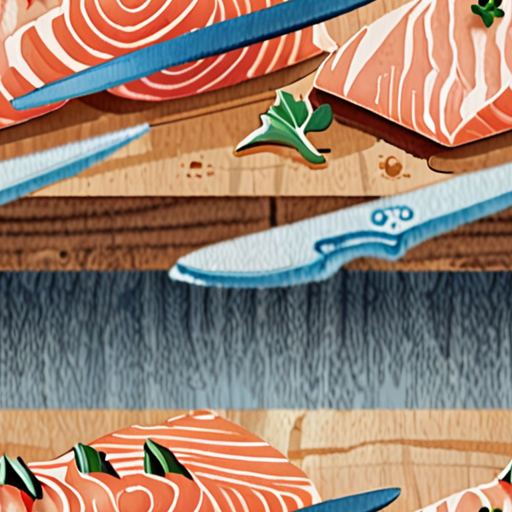When it comes to preparing a delicious and flavorful meal, few dishes are as versatile and impressive as marinated salmon. Whether you’re a seasoned chef or a culinary novice, mastering the art of marinating salmon can elevate your cooking skills and take your dishes to the next level. In this comprehensive guide, we’ll delve into the world of marinated salmon, exploring expert tips and techniques for perfect grilled and baked recipes. From understanding the importance of marination time to discovering the secrets of balancing flavors and textures, we’ll cover everything you need to know to become a marinated salmon master.

Marinating Salmon: A Guide to Achieving Perfect Flavor
I’ve found that 30 minutes is the ideal time to marinate salmon, but you can go up to 60 minutes.
- The marinade will start to break down the fish, and if you marinate it for longer than an hour, it will turn into ceviche and then start to get mushy.
- However, if you’re looking for a more intense flavor, you can try marinating your salmon for 90 minutes or even overnight.
- Just be sure to keep an eye on the fish and adjust the marinating time based on its thickness and your personal preference.
When it comes to choosing a marinade, there are many options available. Some popular choices include:
- Lemon juice and herbs like thyme and rosemary
- Olive oil and garlic
- Soy sauce and ginger
Remember to always pat your salmon dry before cooking to remove excess moisture and promote even browning.
For a delicious grilled salmon, try seasoning it with salt, pepper, and a squeeze of fresh lemon juice before throwing it on the grill.
Alternatively, you can bake your salmon in the oven with a drizzle of olive oil and a sprinkle of chopped herbs for a moist and flavorful result.
Whatever method you choose, be sure to cook your salmon to the recommended internal temperature of 145°F (63°C) to ensure food safety.
With these tips and tricks, you’ll be well on your way to creating mouth-watering salmon dishes that are sure to impress your friends and family.
What is the Best Thing to Season Salmon?
When it comes to seasoning salmon, there are several options to consider, depending on personal taste preferences and the type of dish being prepared.
- Dill: A classic pairing with salmon, offering a fresh, slightly tangy flavor
- Parsley: Adds brightness and freshness
- Thyme: Earthy and aromatic, complementing the richness of the fish
- Chives: Mild onion flavor that works well in combination with other herbs
- Paprika: Adds a subtle sweetness and a beautiful color
In addition to these popular options, other herbs and spices can be used to season salmon, such as lemon zest, garlic powder, and cayenne pepper.
For a more complex flavor profile, try combining different herbs and spices to create a unique blend.
Some popular seasoning combinations for salmon include:
- Lemon Dill: Mix together lemon zest, dill, salt, and pepper for a bright and citrusy flavor
- Garlic Herb: Combine garlic powder, thyme, rosemary, and parsley for a savory and aromatic flavor
- Cajun Style: Mix together paprika, cayenne pepper, garlic powder, and onion powder for a spicy and smoky flavor
Remember to always season the salmon just before cooking, as excess moisture can cause the flavors to become diluted.
Experiment with different seasoning combinations to find the perfect balance of flavors for your taste buds.

The Secret to Best Salmon
When it comes to preparing the perfect salmon dish, there are several factors to consider.
- Freshness: Fresh salmon is essential for achieving the best flavor and texture. Look for wild-caught Alaskan or Pacific salmon, which tend to have a better fat content and less mercury than farmed salmon.
- Marination: Marinating salmon in a mixture of olive oil, lemon juice, garlic, and herbs can enhance its flavor and tenderize it.
- Cooking Method: Grilling, pan-searing, or baking salmon can bring out its natural flavors. However, grilling is often considered the best method as it adds a smoky flavor and crispy texture.
- Serving Temperature: Serving salmon at room temperature can help bring out its full flavor. However, serving it slightly warm can also be beneficial.
- Pairing Options: Pairing salmon with a variety of ingredients such as citrus, herbs, and spices can elevate its flavor. Some popular pairing options include lemon, dill, capers, and avocado.
At Only Fish Recipes , we believe that the key to preparing the best salmon lies in combining these factors. By choosing fresh salmon, marinating it in a flavorful mixture, cooking it using the right method, serving it at the right temperature, and pairing it with complementary ingredients, you can create a truly exceptional salmon dish.
Tips for Preparing the Perfect Salmon
- Seasoning: Seasoning salmon with salt, pepper, and other herbs can enhance its flavor. However, be careful not to over-season, as this can overpower the delicate taste of the fish.
- Oiling: Oiling the grill or pan before cooking salmon can prevent it from sticking and promote even browning.
- Doneness: Cooking salmon until it reaches an internal temperature of 145°F (63°C) can ensure food safety and prevent overcooking.
- Resting: Letting cooked salmon rest for a few minutes before serving can allow the juices to redistribute and the flavors to meld together.
Conclusion

Is it Better to Marinate Salmon in the Fridge or on the Counter?
When it comes to marinating salmon, there are several factors to consider, including food safety and the overall flavor profile.
-
Food Safety
According to food safety guidelines, perishable foods like raw meat, poultry, and seafood should be stored at a consistent refrigerator temperature of 40°F (4°C) or below.
This helps prevent bacterial growth and reduces the risk of foodborne illness.
-
Marinating Temperature
The ideal temperature for marinating salmon is between 38°F (3°C) and 45°F (7°C), which is slightly cooler than room temperature.
This allows the flavors to penetrate the fish evenly without promoting bacterial growth.
-
Benefits of Refrigerator Marination
Marinating salmon in the fridge has several benefits, including:
- Prevents bacterial growth and foodborne illness
- Helps retain the delicate flavor and texture of the fish
- Allows for longer marinating times without compromising food safety
-
Counter Marination Risks
Leaving salmon at room temperature for too long can lead to:
- Bacterial growth and increased risk of foodborne illness
- Deterioration of the fish’s texture and flavor
- Inconsistent marination results due to varying temperatures
-
Best Practices for Marinating Salmon
To ensure safe and effective marination, follow these best practices:
- Store salmon in a covered container at the bottom shelf of the refrigerator
- Keep the marinade refrigerated at 40°F (4°C) or below
- Marinate for 30 minutes to 2 hours, depending on the recipe and personal preference
Do You Rinse Marinade Off Salmon?
When preparing salmon, many people wonder whether to rinse the marinade off before grilling or baking.
- Rinsing the marinade off can help reduce the sodium content of the dish, making it a healthier option.
- However, some argue that rinsing the marinade off may also wash away beneficial flavors and nutrients.
The Benefits of Rinsing Marinade Off Salmon:
- Reduces sodium content: Rinsing the marinade off can help minimize the amount of sodium consumed in the dish.
- Prevents overpowering flavors: Excess marinade can sometimes overpower the delicate flavor of the salmon, making it taste bitter or too salty.
The Drawbacks of Rinsing Marinade Off Salmon:
- Loses beneficial flavors and nutrients: Rinsing the marinade off may also wash away beneficial flavors and nutrients that have been absorbed by the salmon during the marinating process.
- Adds extra steps: Rinsing the marinade off requires an extra step in the cooking process, which can be inconvenient for some cooks.
Alternatives to Rinsing Marinade Off Salmon:
- Pat dry with paper towels: After removing the salmon from the marinade, pat it dry with paper towels to remove excess moisture and prevent steam from forming during cooking.
- Use a gentle scrubbing motion: Gently scrub the surface of the salmon with a soft brush or sponge to remove excess marinade without washing away beneficial flavors and nutrients.
Best Practices for Marinating and Cooking Salmon:
- Choose a balanced marinade: Select a marinade that balances acidity, sweetness, and savory flavors to enhance the natural taste of the salmon.
- Don’t over-marinate: Limit the marinating time to prevent the salmon from becoming too acidic or developing off-flavors.
- Cook to perfection: Cook the salmon to the recommended internal temperature to ensure food safety and optimal texture.

How Long Should Salmon Be Left Out Before Putting in the Fridge?
When handling raw fish like salmon, food safety is crucial to prevent spoilage and potential health risks.
- According to the USDA, seafood should never be left out for more than two hours.
- This timeframe applies regardless of the temperature, whether indoors or outdoors.
For commercially canned fish, such as tuna, you can store it for up to five years in the pantry.
However, for home-canned fish, it’s recommended to consume it within one year.
For optimal storage, keep salmon refrigerated at a temperature below 40°F (4°C).
Always check the fish for visible signs of spoilage before consuming it, such as sliminess, off odors, or mold growth.
Remember, when in doubt, throw it out!
Storage Tips:
- Avoid cross-contamination by storing raw fish separately from cooked and ready-to-eat foods.
- Keep raw fish wrapped tightly in plastic wrap or aluminum foil to prevent moisture loss and contamination.
- Label and date the stored fish to ensure you consume the oldest items first.
Conclusion:
By following these guidelines, you’ll be able to safely handle and store salmon, ensuring a delicious and healthy meal for yourself and your loved ones.

0 Comments